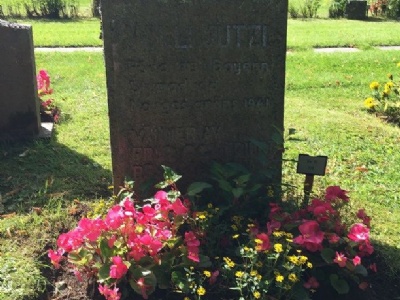Eda Cemetery
At Eda cemetery, about five kilometres south of Charlottenberg, Värmöland County, (and about ten kilometres from the Norwegian border), the German soldier Willi Jutzi is buried. Jutzi served in the German Luftwaffe and was stationed at Gardermoen airport. During the service he met the Norwegian girl, Ragna Fevik, who worked at Garderomens casino. Although Jutzi was married and had children in Germany, they fell in love and decided to flee and seek asylum in neutral Sweden. On June 26, 1941, Jutzi departed from leave and fled with Ragna across the border at Skillingmark. They stayed in the forests around the border about two weeks when they were taken into custody by the Swedish police. Jutzi’s asylum application was rejected, but Ragna was offered to stay but declined. They were returned to the same place they had crossed the border, but since there were no German soldiers at the border, the couple hid again in the woods. Both Jutzi and Ragna knew what would happen if Jutzi went back, he would immediately be arrested and shot for desertion.
The couple lived in poor conditions in the forests around the border until they were again arrested by Swedish police in October 1941. This time the police contacted the state department for advice, the answer was clear, Jutzi would be returned to Norway. Ragna was once again offered asylum, but declined again. In order to ensure that Jutzi was surrendered, it was decided that the surrender would take place at the guarded border crossing at Eda. Jutzi was escorted by the Swedish police and the idea was that he would be handed over to the german police. But when they arrived at Eda, Jutzi managed to escape into the woods. The policemen took up the hunt and fired but Jutzi managed to escape. Ragna, on the other hand, was handed over and sentenced to a minor sentence. Barely a year later, a young couple found a body in a near river (Vrånga and not far from where Jutzi managed to escape) and identified as Willi Jutzi. What the cause of death was could not be determined. Jutzi was buried on July 8, 1942 in Eda cemetery.
Current status: Cemetery (2016).
Location: 59° 50' 24" N 12° 18' 49" E
Get there: Car
Follow up in books: Andersson, D.V.: Jutzi: ett drama vid gränsen (1961).

For people in the area, Jutzi is well known and the drama of his escape and what happened to him has created a myth. A myth that has also spread outside the area and attracted such interest that Jutzi’s grave is marked out on the cemetery’s orientation board.